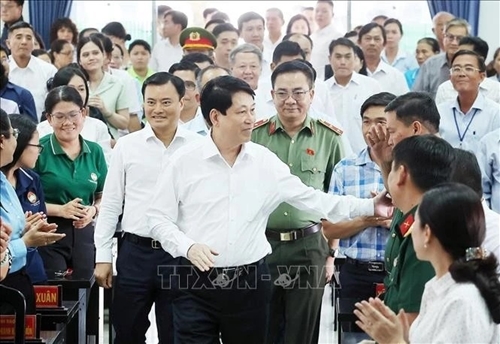Speaking at the meeting, the President praised the voters’ heartfelt and responsible feedback, which reflected deep concern for local, citywide, and national development. Their engagement, he noted, also demonstrated trust in the National Assembly’s activities.
    |
 |
|
State President Luong Cuong meets with voters in Hoc Mon and Cu Chi district, Ho Chi Minh City. |
He highlighted four key resolutions issued by the Politburo, referred to as the "Four Strategic Pillars", focusing on breakthroughs in science and technology, innovation and digital transformation, international integration in the new context, reform of lawmaking and enforcement, and the development of the private sector.
He noted that Vietnam’s socio-economic situation in the first half of 2025 showed continued positive momentum. Macroeconomic stability was maintained, inflation kept under control, major economic balances secured, and social welfare upheld. Living standards remained stable with improvements recorded. Many key economic indicators surpassed those of the same period last year, with GDP growth for the first half projected at around 7.3%, placing Vietnam among the fastest-growing economies in the region and globally. Political and social stability, national defense and security were maintained, social order ensured, and international integration enhanced, raising Vietnam’s international reputation and stature. Anti-corruption and Party-building efforts also saw continued positive progress, creating a stable and peaceful environment for national development.
President Luong Cuong affirmed that the achievements mentioned were in no small part thanks to the contributions of the Party, authorities, and people of Ho Chi Minh City, including Hoc Mon and Cu Chi districts.
He noted that the upcoming merger with Binh Duong and Ba Ria – Vung Tau provinces will transform Ho Chi Minh City into a mega-city of roughly 6,770 sqkm and over 13.6 million people, with 168 wards and communes, including the Con Dao special zone. This unprecedented and ambitious reform aims to streamline governance, improve efficiency, and bring the administration closer to the people. However, it will pose significant challenges, requiring the united effort of the entire political system, Party committees at all levels, authorities, and strong support from the public.
In this context, the President urged the city to mobilize all resources to ensure the seamless and effective operation of the new two-tier local administration system, starting from July 1, with uninterrupted governance from the city to the commune level. The new system must not only function more efficiently but also be genuinely close to the people, ensuring no disruption to daily life while providing maximum support to citizens and businesses.
He emphasized that this new model requires high standards, with a large volume of work ahead. He stressed the importance of carefully selecting and organizing personnel, with a merit-based, objective approach that prioritizes matching the right people to the right roles.
He called on Ho Chi Minh City to continue implementing these national policies at the grassroots level in a way that upholds the Constitution and laws. He underscored the importance of democratic centralism and listening to the legitimate aspirations of the people. The city must effectively implement breakthrough resolutions that serve as the foundation and driving force for Vietnam’s development in the new era.
The President also stressed the need to further promote socio-economic development, ensure public security and order, and improve social welfare in the city.
He instructed the city to successfully lead and organize Party congresses at all levels for the 2020–2025 term, viewing this as a historic opportunity for Ho Chi Minh City, Ba Ria – Vung Tau and Binh Duong to jointly unlock their potential and create a new development space, contributing to Vietnam’s path towards prosperity.
During the meeting, voters raised concerns about ongoing challenges affecting daily life, such as urban infrastructure, planning, land management, and incomplete projects. They also shared thoughts on governance issues and public policies in the context of the transition to a two-tier local government.
Voters proposed increasing investment in information technology at the ward/commune level, establishing dedicated funding for IT infrastructure, upgrading internet connectivity, digital meeting equipment, and centralized data storage systems. They urged the rapid completion of online public service delivery, greater incentives and social engagement in building a digital economy and society, and expanded training for grassroots officials and the public through basic “digital literacy” programs.
Source: VNA